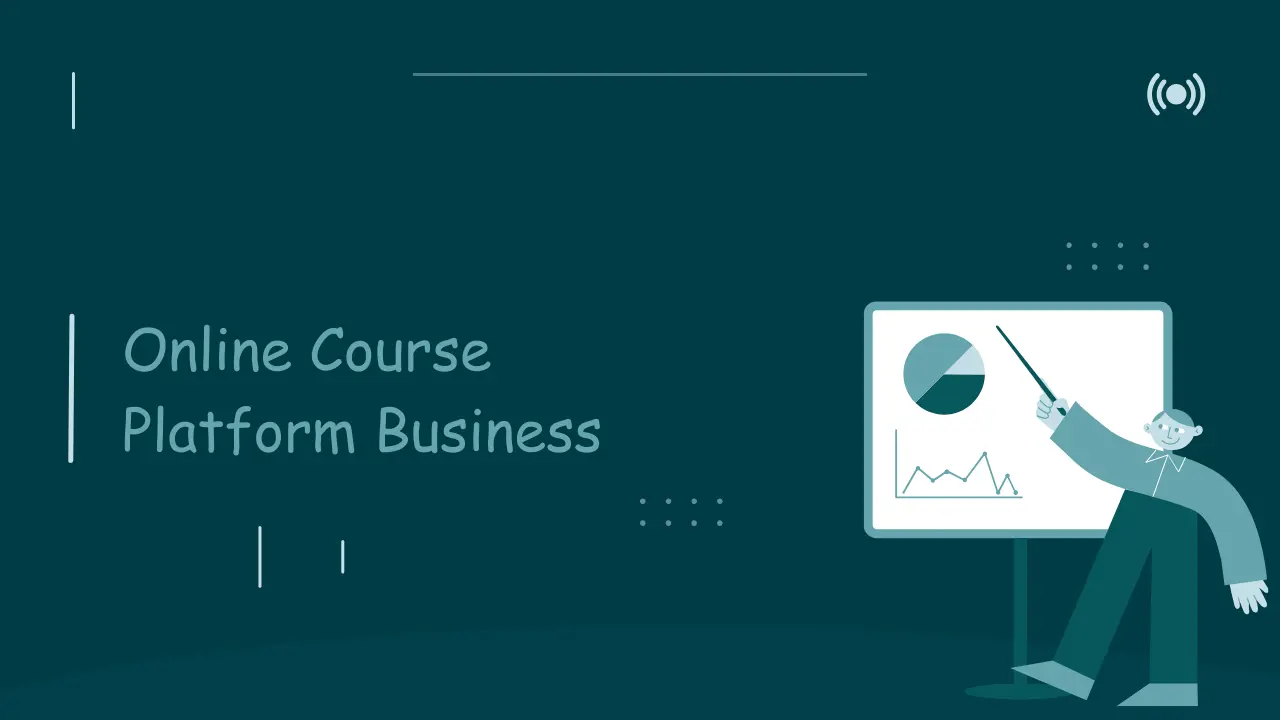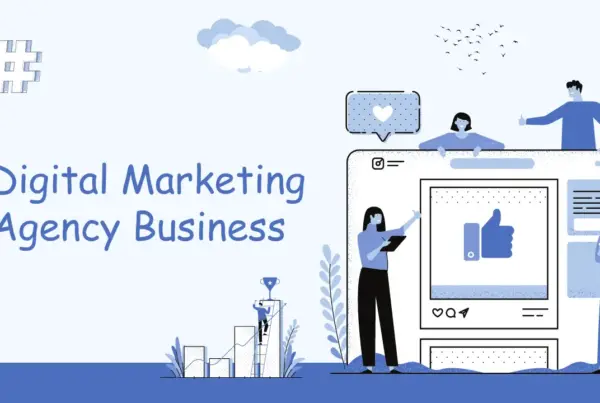Learning how to start an online course platform business in today’s digital era presents a golden opportunity for entrepreneurs to tap into the burgeoning eLearning market. As the demand for online education is constantly increasing in the current dynamic digital age, this platform has created a suitable possibility for aspiring entrepreneurs to carve out a niche in the ever-expanding realm of eLearning.
Launching your distinctive online course platform holds the promise of financial success. And it presents a unique opportunity to make a meaningful impact by democratizing access to knowledge and skills.
You can build a lucrative venture while empowering learners worldwide with the right approach and implementation.
Table of Contents
A report by Statista states that the revenue of the global online learning platforms market is expected to gain US$58.45 billion in 2024. This market’s CAGR (Compound Annual Growth Rate, 2024-2028) is estimated to reach 4.24%, which will reach a market size of US$69.02 billion by 2028.
They (Statista) also say that the number of users of this eLearning course platform will reach 1.0 billion by 2028.
Also, the user penetration is hoped to be 10.1% in 2024 and is expected to grow by 12.0% by 2028.
And last but not least, they also show that the ARPU (Average Revenue Per User) is projected to amount to US$74.59 in 2024.
However, navigating the intricacies of building and scaling an e-learning course platform requires meticulous planning, strategic foresight, and a profound insight into market dynamics.
Before creating a digital learning business, let’s know what an online course platform business is, its model types, and what essential requirements should be combined.
What is an Online Course Platform Business?
An online course platform is a web portal or web space that offers students everything they need for educational purposes with content and resources. It includes academic lectures, granted resources, opportunities to chat and meet with other students, and many more.
In other words, it’s a platform that combines a library of tools and services to support educators and entrepreneurs in building, operating, and selling online courses. The online course platform is mainly a genre of LMS (Learning Management System).
In short, it is an excellent approach for the teacher to seamlessly impart knowledge to the students and monitor their development quite comfortably.
Basically, digital courses are learning programs that do not require a physical institution but in a virtual space.
Digital learning platforms can focus on a particular skill and be informal. Or, it may be formal, such as leading to a degree or certificate.
These platforms can be used for professional development, blended learning, or employee training:
Professional development
Online learning platforms offer the opportunity for participants to learn new skills without the need for physical classrooms. Examples include Skillshare, Udemy, and LinkedIn Learning.
Blended learning
Educational platforms are online teaching tools used for a combination of in-person and online learning.
Employee training
Enterprises often use LMS for employee training, customer education, and onboarding.
Variety of Online Course Types and Models
According to Kenneth Fee, there are five (05) models of e-learning. They are, for example, online courses, integrated online and offline learning, self-managed e-learning, live e-learning, and electronic performance support.
Successful eLearning Business Models
There are three (03) most common and successful eLearning business models that you can follow.
1. Night School Model
The term night school model originally arose from the idea of skills-based classes to narrate community colleges’ vocational and late afternoon courses. It would not be wrong to say that most e-learning companies conform to the traditional night school model.
Besides, these symphonic models offer a substantial opportunity for students to pay a one-time fee to access curriculum course content. This business model follows a specific structure, including predetermined learning modules, quizzes, assessments, and student testing. So, for example, if anyone is interested in learning, then he/she/they can follow the steps:
- Seek courses on eLearning platforms like Coursera or Udemy.
- Register by paying a nominal charge.
- Obtain the course content.
- Pass the quiz and accomplish the journey.
Suppose someone wants to improve a particular language, subject, or specific skill. In that case, the night school model is the most effective or suitable for them. Therefore, it would be safe to say that most eLearning businesses adopt this business model as a convenient alternative to physical classroom learning.
Above all, it’s a business model that is helpful for those who want to lead cash flow by sale and subscriptions of courses.
2. Academy Model
It is a subscription-based business model that has been a segment of a renaissance for e-learning as a virtual school. It inspires students to learn and flourish with multiple expertise and offers an immense library of courses, videos, and other curriculum learning materials.
For example, when students enroll in a soccer school, they just don’t focus on one skill or aspect. Instead, they come up with an overall good lesson:
- How to shoot, pass, and dribble the ball
- What types of foods (healthy foods) to eat or drink
- How to improve from a sturdy game
- System to communicate with team members
- Process to appeal for college scholarships
Similarly, this academy business model works like a Netflix subscription in the online world. This business model will give students access to the whole library of lessons and courses for a monthly recurring fee. Students can pick and choose what they learn, when they learn, and build their learning.
This business model can also come with plenty of diverse community features, such as:
- Live Q&As
- Coaching calls
- Facebook groups
- One-to-one sessions with the instructors
This model is best for creators, sports fanatics, fitness enthusiasts, and every skilled person in their respective fields. This type of business model covers broad topics first, then each area in detail, and attracts students interested in learning multiple skills.
However, the crux of this business model is the ongoing subscription fees from subscribing students.
3. Combined Model
Nominally, this model represents a combination of the “Night School Model” and the “Academy Model.” This unique model generally allows subscription-based offerings and substantive courses with a one-time fee.
This business model is worthy for learners who are willing to pay extra for additional courses or course material. Essentially, this can help them improve their skills and education.
Types of Digital Course Platforms
In today’s technologically advanced world, myriad online course platforms or digital learning institutes exist to make online learning smooth. It includes, for example, Online schools, Universities, Course Marketplaces, and Employee Training portals.
In recent years, digital course marketplaces have grown at a tremendous rate as they offer a massive scale of courses.
But regardless of the genre of digital course marketplace, they generally have similar destinations; for example,
- Democratizing learning to aid in learning a modern skill.
- Gain valuable certifications from world-class educators.
- Help students get the best grades.
- Improving job anticipation and career opportunities, among other belongings.
Assembling Vital Necessities Before Starting The Business
Before diving into the venture of starting an online course platform business, it’s crucial to ensure you have all the vital necessities in place. Here’s an extended look at what you’ll need:
Clear Vision and Mission
Start by defining the purpose and goals of your online course platform. What do you aim to achieve? How will your platform make a difference in the lives of learners? A clear vision and mission will guide your decisions and strategies.
Thorough Market Research
Conduct comprehensive market research to understand the landscape of online education. Identify trends, assess demand, and analyze competitors to uncover opportunities for differentiation and growth within your chosen niche.
Target Audience Identification
Define your target audience with precision. Consider factors such as demographics, interests, educational background, and pain points. Understanding your audience will help tailor your courses and marketing efforts to meet their specific needs effectively.
Niche Selection
Choose a niche that aligns with your expertise, interests, and market demand. Narrowing down your focus will help you stand out in a crowded market and make it easier to attract and retain learners who are genuinely interested in your offerings.
Business Model Development
Determine your business model and revenue streams. Will you charge for individual courses, offer subscription-based access, or utilize a freemium model? Explore options for monetization, such as course sales, subscriptions, affiliate marketing, or advertising, and choose the approach that best aligns with your goals.
Legal and Regulatory Compliance
Familiarize yourself with your jurisdiction’s legal requirements and regulations governing online education and eCommerce. Ensure compliance with data protection laws, intellectual property rights, and any other relevant rules to avoid legal complications down the line.
Technology Infrastructure
Assess your technological needs and invest in a robust infrastructure to support your online course platform. It includes selecting a reliable hosting provider, choosing the right learning management system (LMS) or building a custom platform, integrating payment gateways, and implementing security measures to protect user data.
Content Creation and Acquisition Strategy
Develop a plan for creating and acquiring course content. Determine whether you’ll create original content in-house, collaborate with subject matter experts, or license existing courses from third-party providers. Focus on delivering high-quality, engaging content that adds value to your learners’ educational experience.
Marketing and Promotion Plan
Craft a comprehensive marketing and promotion strategy to attract learners to your platform. To reach your target audience effectively, utilize a mix of digital marketing tactics, including content marketing, search engine optimization (SEO), social media marketing, email marketing, and paid advertising.
Customer Support and Engagement
Prioritize customer support and engagement to foster a positive user learning experience. Provide multiple channels for users to reach out for assistance, such as email, live chat, or a dedicated support portal, and actively engage with your community through forums, webinars, and social media.
Analytics and Performance Tracking
Implement analytics tools to track key metrics and performance indicators related to user engagement, course completion rates, revenue generation, and more. Use data-driven insights to refine your strategies, optimize your offerings, and drive continuous improvement.
Sustainability and Scalability
Plan for long-term sustainability and scalability from the outset. Build a scalable business model and infrastructure to accommodate growth and evolving market demands. Continuously innovate and adapt to stay ahead of the curve and ensure the long-term success of your online course platform.
By addressing these vital necessities before launching your online course platform business, you’ll be better equipped to navigate the complexities of the e-learning industry and set yourself up for success in the competitive online education market.
How To Start an Online Course Platform Business
Launching your extraordinary online course platform holds immense potential for profitability and impact, but it requires meticulous planning and execution.
This comprehensive guide is designed to provide you with a detailed roadmap, covering every aspect from conception to fruition, ensuring the successful establishment and growth of your online course platform business.
Conduct Comprehensive Market Research and Select a Niche
Selecting a niche and conducting extensive market research is critical to successfully establishing and growing a digital course platform business. All you need to do is:
Choose Your Niche Wisely
Select a niche that aligns with your expertise and passions while considering market demand and competition levels. Basically, where there is considerable demand for specialized knowledge or skills but relatively little competition. And it allows you to establish a strong footing and effectively differentiate your platform.
Define Your Target Audience
Start by identifying your prospective learners’ demographics, interests, and educational needs. You can also begin by conducting thorough demographic and psychographic research to gain insight into your potential students’ characteristics, preferences, and pain points.
Analyze the Competition
Delve deep into the competitive landscape of the online course industry and thoroughly research existing digital course platforms within your niche to understand their offerings, pricing structures, and target audiences.
Also, analyze the strengths, weaknesses, and unique value propositions of existing platforms within your target.
Strategize Platform Planning and Development
Planning an advanced platform and strategizing development is vital to the success of an e-learning business. You must pay close attention to this.
Determine Your Platform Type
Decide whether to create a custom-built platform, use an existing learning management system (LMS), or use white-label solutions.
Accordingly, evaluate the pros and cons of building a custom platform from scratch, using an existing learning management system (LMS), or using white-label solutions, considering factors such as scalability, customization options, and time-to-market factors.
Define Essential Features and Functionality
Build a comprehensive feature set that includes essential functionalities such as user registration and authentication, course creation and management tools, multimedia content support, progress tracking, discussion forums, and integrated payment gateways.
Prioritize User Experience (UX) Design
Design an intuitive, visually appealing, user-friendly interface that increases user engagement and simplifies seamless navigation. And an interface that fosters a sense of community among students.
Focus on Content Creation and Acquisition
Focusing on quality content creation and acquisition is another significant aspect of any digital business. Operationally, this particular section is an indispensable tool for the success of your business.
Develop Compelling Course Content
Invest in creating high-quality, engaging, and educationally sound course materials that cater to your target audience’s diverse learning styles and preferences. And it also ensures that each course provides real value and promotes meaningful learning outcomes.
Collaborate with Expert Instructors
Build and collaborate with renowned subject experts, industry practitioners, and experienced academics to design and deliver courses that deliver real value to learners.
Also, develop courses based on competence, credibility, and real-world relevance, leveraging their domain knowledge and teaching expertise to enrich the learning experience.
Curate Additional Content
Consider supplementing your original course content with licensed or third-party courses to enrich your platform’s offerings.
Enhance your original course content with curated resources, supplemental materials, and third-party courses that complement your platform’s thematic focus. As a result, you will be able to provide your students with a comprehensive and well-rounded learning experience.
Craft a Robust Marketing and Promotion Strategy
Developing a solid marketing and promotion strategy is essential for the growth of your business. Through this, it becomes easier to drive awareness and engagement in your industry.
Establish Your Brand Identity
Develop a unique brand identity, voice, and positioning strategy for your business that resonates with your target audience and effectively communicates your platform’s mission and values. Also, present your brand narrative and a clear value proposition that differentiates you from competitors.
Harness the Power of Content Marketing
Create and distribute valuable content such as blog posts, case studies, video tutorials, podcasts, webinars, and infographics to attract and engage potential students while establishing your authority in the field. As a result, it will be easier to address your target audience’s informational needs, pain points, and desires.
Optimize for Search Engines (SEO)
Apply SEO best practices to drive organic traffic to your platform and optimize your website architecture, content structure, metadata, keywords, and backlink profile for higher search engine rankings.
As a result, you will be able to increase your website visibility and ranking, driving qualified leads and discoverability of your platform in major search engines.
Implement Effective Monetization Strategies
At this stage of starting a successful online course platform business, you need to implement an effective monetization strategy. Through this, you can comfortably maintain your business revenue drive and growth.
Determine Pricing Models
Explore different pricing models, including one-time payments, subscription-based memberships, tiered pricing plans, bundled course packages, freemium offerings, and pay-per-course options, to determine the best approach for your platform.
You can also align your pricing strategy with the perceived value of your course, the purchasing power of your target audience, and prevailing market dynamics.
Offer Value-added Services
Explore opportunities to access additional services such as certification courses, personalized coaching, mentorship programs, live webinars, virtual conferences, or exclusive content to enhance the overall value proposition for your students.
Also, you can enrich your platform’s student’s learning experience and encourage user engagement and loyalty.
Explore Affiliate Marketing Opportunities
Develop strategic partnerships with influencers, educational institutions, corporate clients, affiliate marketers, professional associations, or industry experts to promote your courses in exchange for sales commissions to expand your reach and customer base.
Besides, you can leverage their network, audience, and credibility to drive your traffic and generate leads through referral marketing initiatives.
Execute a Seamless Launch and Focus on Sustainable Growth
To achieve a flawless launch and sustainable growth through iterative improvement, you need to put a lot of emphasis on the following matters:
Conduct Thorough Beta Testing
Prior to the official launch, conduct extensive beta testing and usability testing to solicit feedback from early users and identify any potential problems, usability issues, performance bottlenecks, or areas for improvement.
Also, you can seek feedback from pilot users to identify and correct any technical errors.
Plan for Scalability
Anticipate future growth and prepare for scalability by investing in scalable hosting solutions, cloud-based infrastructure, content delivery networks (CDNs), and server resources that can accommodate growing demand and user volume.
This investment can accommodate exponential growth in user traffic, enrollment, and content consumption without compromising your business’s performance, reliability, or security.
Embrace Continuous Improvement
Foster a culture of continuous improvement, innovation, and agility within your organization, encouraging cross-functional collaboration, data-driven decision-making, and rapid iteration cycles as you strive to improve the user experience.
You can refine your marketing strategies based on technological advances, expand your course catalog, and adapt to market trends, technological advances, and student preferences to ensure long-term success.
Final Thought
Embarking on the journey of launching and scaling your unique online course platform business is an exhilarating yet challenging endeavor that demands unwavering commitment, strategic vision, and relentless execution.
By following this comprehensive blueprint, you’ll be equipped with the knowledge, tools, and strategies necessary to navigate the complexities of the e-learning landscape, overcome obstacles, and seize opportunities for growth and success.
Remember to stay focused on delivering exceptional value to your learners, cultivating a vibrant learning community, and positively impacting the lives and careers of countless individuals around the globe.
Stay agile, stay innovative, and above all, remain focused on delivering exceptional value to your learners, and success will inevitably follow. With dedication, perseverance, and a spirit of innovation, the possibilities are limitless in the exciting world of online education.




